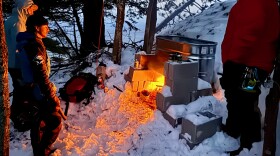Every summer for 22 years, people would gather amid the pines of the Manistee National Forest, near Wellston, for the three-day Hoxeyville Music Festival each summer. It was billed as “pure north country peace and celebration.”
Performers like Billy Strings were common at Hoxeyville. Strings would go on to win a Grammy in 2021.
"Billy has really exploded," said Jerry "JC" Coyne, owner of Blarney Stone Media. "You know, his asking number has gone from, what, $25,000 to $200,000."
Blarney Stone Media owns Q100 FM, a rock and roll station in northern Michigan. Coyne sponsored Hoxeyville for the last six to seven years.
And this year, Hoxeyville called it quits.
Rising costs, shrinking crowds
It has become really expensive to run a festival these days, including the cost for artists.
“You've got to sell a lot of advanced tickets, and you have to pay for those artists in advance," Coyne said. "And when you don't get the walk up or the buy in, that's what caused Hoxeyville fold."
Coyne said Hoxeyville had put on a couple bluegrass events in the last few years, but they didn't perform well.
"They didn't get nearly as many people for the spring show, and then they didn't have the cash reserves to pay for big artists up front and the financial legs just fell out from underneath it."
Organizer Jake Robinson was not available to speak with IPR in time for this story.
But Hoxeyville wasn’t the only festival to end this year in northern Michigan. The Earthwork Harvest Gathering in Leelanau County also came to an end, with its organizer telling the Glen Arbor Sun that it had become unsustainable to manage.
Coyne says there’s still a hunger for live music, but "the formula has changed so much. And I don't think there's a magic formula for it."
Not only that, but people in northern Michigan have a bounty of ways to spend their free time, especially when the weather is fine, especially if they live here.
“How many opportunities do you get to take the boat out on the lake?" Coyne said. "OK, I'm going to take a whole weekend off from the great weather and boating on Silver Lake, and I'm going to go down to Hoxeyville? I don't know. Obviously, people's priorities are not quite the same as they were just four or five years ago."
Plus there are so many ways to see live music. Big arena shows are really popular these days. And if it’s just listening you want, streaming services like Spotify are there.
In an interview with NPR’s Planet Money, music industry economist Will Page said millennials mostly drove the music festival boom from 2010 to 2020. That also led to an over-saturation of festivals. Also, as people get older, they may want cozier amenities.
Just take it from Coyne.
“You know, to me at age 60 plus whatever, I'm not camping out at Hoxeyville, nor Am I camping out at Bourbon and Beyond or Sonic temple," he said. "You know, I went to Sonic a few years ago, I stayed in downtown Columbus in a Radisson and went back and forth to the show. I wasn't staying in the back of a camper. That's just not me.”

So now a lot of festival goers could be aging out of that experience. And music festivals may not be the vibe for the next generation.
Attracting younger crowds
Social psychologist Jonathan Haidt wrote a best selling book that calls Gen Z the “anxious generation.” He says time spent on phones and the effects of pandemic shutdowns have made some of them feel more isolated, lonely and also crowd averse.
Caroline Barlow, with BlissFest near Petoskey, said they still have a strong millennial group going to festivals, but younger folks seem like they've been dragged there by their families.
“What do they want?" she said. "I think that's like my ongoing question right now."
BlissFest 2024 happened in mid-July. It was their 43rd year and they “sold out” — the campground was packed. That hasn’t happened since before the pandemic.
So what are they doing right, as other festivals suffer or fold?
Barlow said they took some risks, like paying extra money for bigger acts and upping the production budget.
She also pins their success on putting on a show for multiple generations of people.
“It's about not putting all your eggs in one basket, but also staying true to your identity," Barlow said. "I keep being told ... Blissfest needs to book these giant acts to get people to show up. Yes, we do need some name recognition, but I really think to know your identity and to play within that — that's part of what makes you unique, just like a human being, right?”
But they are not bulletproof. Barlow said they are still facing the same issues that exist within the industry, like rising costs. And ticket sales were slow far in advance of the event but then surged two weeks before the show.
BlissFest also needs some infrastructure upgrades. Organizers want to improve the stage and lodging for artists is also a top-of-mind issue.
“People don't want to live in community housing for three days, or they don't really want to camp. They want to stay in hotels,” she said.
Barlow said the nearest hotel is 20 miles from the festival venue.
“We certainly understand the struggles that other festivals and our friends have faced," Barlow said. "We know it's not easy. I think it'll all shake down, and people will show up. I hope."






